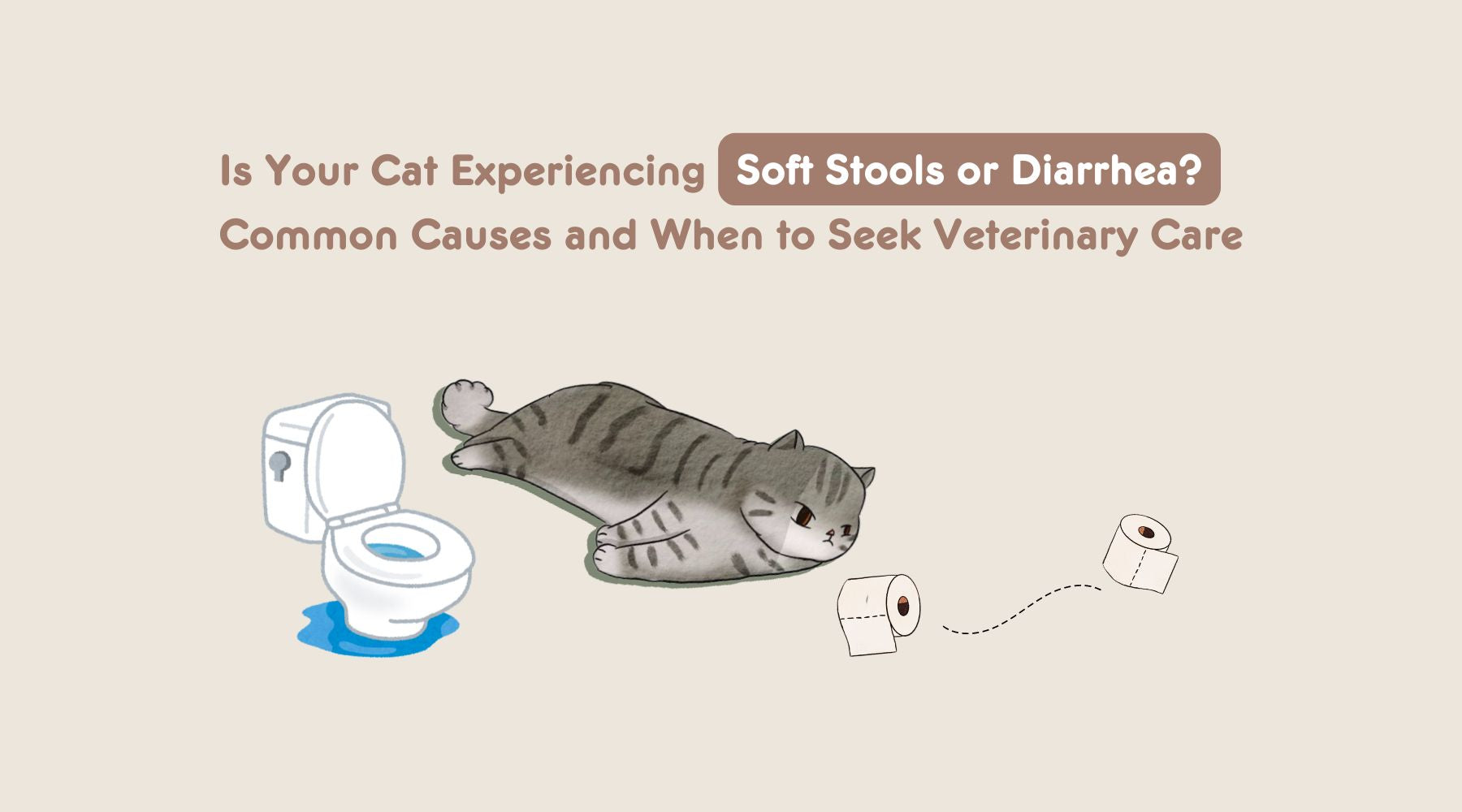
Is Your Cat Experiencing Soft Stools or Diarrhea? Common Causes and When to Seek Veterinary Care
As a cat parent, one of your daily routines undoubtedly involves "scooping the litter." However, while cleaning the litter box, it’s crucial not to overlook the importance of analyzing your cat’s feces, as its consistency can provide insight into your cat's health. But what should you do if you discover your cat has diarrhea?
Diarrhea is defined as follows:
- Normal Stool: Deep brown in color, with a smooth, almost log-like shape.
- Diarrhea (Soft Stool): Unformed feces that appear loose or watery; it may sometimes have a sticky texture.
Cats naturally tend to hide their discomfort or illness, so observing "the shape of their feces" is one of the quickest and most intuitive ways to assess their health condition.
What to Do When Your Cat Has Diarrhea
When your cat experiences diarrhea, you can gather information using the process of elimination. Here are some questions and observations you can discuss with your veterinarian to help them quickly determine the cause of your cat's diarrhea:
-
Have you changed their diet recently?
For example, switching food brands or introducing new treats. Cats with sensitive stomachs may struggle to adapt to sudden dietary changes or may have food allergies that cause diarrhea. -
Have there been any improper feeding practices?
For instance, irregular feeding times can lead to binge eating or prolonged hunger, or they may have consumed overly greasy or salty foods, expired items, or difficult-to-digest foods. -
Have you been keeping your cat's supplies clean?
Both dogs and cats carry bacteria in their saliva. If food and water bowls are not cleaned regularly, a slippery "bacterial biofilm" can develop on the surface. When cats consume food or water from these bowls, they may easily develop diarrhea. -
Have you deworm your cat recently?
Many intestinal parasites, such as tapeworms, roundworms, and hookworms, can cause vomiting and soft stools in cats. -
Has your cat been in contact with other cats?
If your cat has interacted with unfamiliar cats and hasn’t received core vaccinations, the most serious consequence could be feline panleukopenia. Common symptoms, in addition to diarrhea, include lack of appetite, lethargy, vomiting, and foul-smelling or bloody stools.

When to Seek Immediate Veterinary Care
The severity of diarrhea can vary significantly. Here are three key indicators that may require immediate veterinary attention:
- Lethargy or significant loss of appetite
- Repeated diarrhea accompanied by vomiting
- Visible parasites in the feces or blood in the stool
How to Support Your Cat’s Digestive Health
-
Establish Good Eating Habits
Overeating or allowing your cat to go too long without food can harm their digestive system. It is generally recommended to feed cats smaller, more frequent meals. Additionally, be mindful of wet food or canned food; if left out too long, even if your cat hasn’t finished, it should be removed. -
Strictly Control Food Quality
Avoid frequently changing your cat's food. If you must switch, do so gradually by mixing the new food with the old to allow your cat’s digestive system time to adjust. -
Maintain Clean Bowls
After your cat finishes eating, promptly wash their food and water bowls and allow them to dry. It’s best to use pet-safe dishwashing detergents with natural ingredients, as human dish soaps often contain citrus, fragrances, and chemicals that can harm their respiratory and digestive systems. -
Always Provide Fresh Water
Sometimes, diarrhea can be related to water quality, so keep your cat's water bowl clean and the water fresh. -
Regularly Deworm Your Cat
Many internal parasites reside in the intestines and absorb nutrients, leading to diarrhea, weight loss, and decreased appetite. An effective deworming strategy should address both internal and external parasites for comprehensive safety. -
Adjust Diet Based on Diarrhea Severity
Unless your cat is experiencing continuous watery stools or is vomiting to the point where they can’t take medication or eat, fasting is usually unnecessary when digestive issues arise. On the contrary, offering appropriate food can alleviate discomfort and improve digestion.
Your veterinarian may recommend specialized gastrointestinal prescription diets, such as Hill's I/D Cat Gastrointestinal Formula, which is rich in calories and easily digestible proteins, helping to reduce the burden on the digestive system.
Introducing Protexin Pro-Kolin Advanced for Cats: A Solution for Diarrhea
If your cat is experiencing diarrhea, consider adding Protexin Pro-Kolin Advanced for Cats to their care routine. This palatable chicken-flavored paste can effectively help to firm up faeces and support gastrointestinal health in cats.
Key Benefits:
- Contains Beneficial Micro-Organisms: Pro-Kolin Advanced is enriched with probiotics that help stabilize gut flora, promoting a healthy digestive system.
- Prebiotic Sources: The inclusion of several prebiotic sources aids in nourishing beneficial gut bacteria, further supporting digestive health.
- Dual-Source Binding Agents: This advanced formula incorporates kaolin and montmorillonite, which are known for their ability to help firm up feces, making it particularly effective for managing loose stools.
- Soothing Fibers: The soothing fibers in the paste support overall gastrointestinal function, helping to relieve symptoms associated with acute diarrhea more quickly and effectively.
- Taurine Inclusion: With taurine, an essential amino acid for cats, Pro-Kolin Advanced not only addresses digestive concerns but also contributes to your cat's overall health.
Check out more details about Pro-Kolin Advanced for Cats


Leave a comment